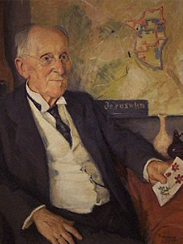Institutes
Faculty of Theology
Research Institute for Evangelism and Church Development (IEEG)
The IEEG was founded in Greifswald on 1st April 2004 as a university institute of the Faculty of Theology. It is the first and so far only university institute in Germany focusing on research and teaching in the areas of evangelism and church development. It takes its lead, for example, from the Synod of the EKD (Evangelical Church in Germany) in Leipzig in 1999, which dealt with the ‘rehabilitation’ of the missionary topic in the Evangelical Church.
Gustaf Dalman Institute

(An old-established institute, not an institute in the sense of § 92.1 of the Landeshochschulgesetz (State Higher Education Law, LHG))
The Gustaf Dalman Institute offers a comprehensive portrait of a Palestine largely characterised by farmers and herdsmen which is no longer in existence. The German theologian, Gustaf Dalman (1855-1941), collected diverse materials before the First World War which for him were characteristic for the land of the Bible. Today the Institute’s collection contains rock and plant samples, household utensils and agricultural tools, ceramics, small archaeological finds, maps, contour maps, around 15,000 historical photographs and a library with around 5,000 volumes – including some rare 16th Century prints.
Victor Schultze Institute
(An old-established institute, not an institute in the sense of § 92.1 of the Landeshochschulgesetz (State Higher Education Law, LHG))
This collection, named after Victor Schultze, was sanctioned (and founded) by a ministerial decree on 1st December 1884. Although the collection is from the 19th Century and so stems from a different academic tradition, it still serves as a good starting point for a modern connection and collaboration between theology, archaeology and art. The collection is a real asset for the Faculty of Theology and not simply an embellishment.
